
Is Tyler Perry running for office? Despite a few moments that allow critical or at least skeptical views of the actor/writer/director/studio mogul, “Maxine’s Baby: The Tyler Perry Story” is like a nearly two-hour ad for Perry, the sort of thing you’d play at a political convention to hype the crowd. There’s no denying at this point that he’s one of the most fascinating people in show business: a transformational figure in the movie and TV industries. He’s a cultural pioneer, a dazzlingly successful entrepreneur, and somebody who’s overcome trauma by using it as fuel for his art. So, a respectful and serious documentary about him was long overdue.
But this movie—co-credited to Armani Ortiz, a regular director on Perry’s TV programs, and Gelila Bekele, Perry’s ex-girlfriend, and mother of his son Aman—is worshipful and pours on hype in gallon jugs. It even has a virtually nonstop gospel-tinged score with heavenly choir voices and ethereal effects. There’s a lot of moving and painful material in here, particularly during the early sections about the abuse inflicted on Perry by his father and many triumphant moments (mainly having to do with Perry proving, time and again, that he knows his still underserved audience better than anybody, and is resourceful enough to sidestep the white establishment and do things his way).
“Maxine’s Baby” also seems to be counteracting various complaints about Perry, such as the charge that even his best work has quality control problems (the film redirects our attention instead to his awesome productivity) and the complaints that he has a reactionary streak when it comes to the integration of religion into drama, the portrayal of “fallen” women redeeming themselves, and his performances as his most famous character, the human steamroller of a matriarch Madea. (Perry tells the filmmakers that his first ten scripts were essentially about honoring and understanding his mother, Maxine, the woman in the title). We more often hear than see criticism of Perry and his work in the form of unattributed sound bites from news and talk shows. The whole film has major attribution problems. You often have no idea who is speaking or why they were interviewed or quoted, and when you do get an ID tag, sometimes it’s an eye-roller, like the one that describes Oprah Winfrey as a “Global Media Leader” (she’s the last person who needs fluffing) or the one that lets you know that they put Perry’s own publicist on camera to talk about how great he is.
This is the second documentary I’ve seen in the past month—the other is “Sly,” about Sylvester Stallone—that more often plays like an advertisement for a personal brand or a mythologizing instrument that validates a celebrity’s fans than a study of a complicated person, smoothing over the rough edges of the personal life or ignoring them outright while stressing the subject’s status as an inspirational figure who overcame obstacles that would have stopped others. (There are increasing numbers of these documentaries being released now, usually but not always about musicians.)
The two most effective parts are the section about Perry’s abuse by his father, who beat him bloody on the regular, and the section analyzing the appeal of Perry’s staggeringly successful run as a self-made theater impresario who could sell out venues with thousands of seats by telling stories about working-class, church-attending, mostly culturally conservative Black characters like the people he grew up with. The plays, and later the films and TV shows, reflected the experiences of audiences that (as Perry’s friends Whoopi Goldberg and Oprah Winfrey tell the filmmakers) were badly represented when they were represented at all, and the gratitude at being represented has translated into a seemingly bottomless reservoir of goodwill that carries Perry through career lulls and setbacks. “I recognized that it was feeling a level and depth of understanding that regular media would not be able to comprehend,” Winfrey says of Perry’s early work, such as “I Can Do Bad All By Myself,” “Diary of a Mad Black Woman,” and “Woman, Thou Art Loosed.”
The analysis and defense of Madea, who was criticized as a stereotype and even picketed (mainly by racist homophobes), is enough reason to see the documentary if you’re interested in Perry’s work. The sharpest insight comes from poet/playwright/artist Carl Hancock Rux, who says that Perry’s play and film “Diary of a Mad Black Woman” is “not really the diary of a mad black woman or an angry black woman. It’s the diary of a puppet.”
Rux later delivers a line so incisive and unsparing that it temporarily halts the movie’s image-burnishing momentum. About midway through, a brief section deals with criticisms of Perry as a merely canny entertainer who exploits stereotypes for profit (one of his most famous detractors was Spike Lee). Then Rux comes in and pretty much says that Perry is shallow and superficial in how he portrays his own people: “I don’t see the evidence that he entered this creative marketplace armed and informed, to really give something noble and valuable to a Black-Brown community,” he says. “Don’t believe that.”
Viewer whiplash might occur at this point. It’s rare to see a film about a famous person produced by his own colleagues and/or loved ones that would allow a kill shot like this one to stay in a finished cut. You have to admit that only a person with a secure ego would be OK with even booking such a person as a talking head. But the movie is not interested in asking Rux what he meant or illustrating it with clips, so it has no value as anything other than a tantalizing momentary provocation.
Very soon after that, the movie lionizes Perry for his productivity (he says he’s written as many as 20 scripts in two weeks) and for self-financing the first ten episodes of his cable series “House of Payne,” which caused the network to order 90 more (enough for a syndication deal) and led to what is now known as the “10/90 split” in TV production deals. The pinnacle for Perry the mogul was the 2019 opening of his studio in Atlanta on the former Ft. McPherson Army facility, with soundstages named for Black artists who inspired him (including Winfrey and Goldberg), built on land where architects of the Confederacy once plotted to keep Perry’s ancestors in bondage.
“Maxine’s Baby” more than makes the case for Perry’s importance as a cultural and economic figure as well as a machine cranking out unreal amounts of product. “Nobody can outwork me,” Perry says, deservedly bragging on himself a little. “James Brown would’ve bowed down.”
But the overall effect is like one of those talk shows where the host talks over people to steer everything back to the narrative he wants to advance. It has a smidge of depth and takes chances that similarly worshipful documentaries probably wouldn’t. But it also cracks a lot of doors without actually opening them up and walking through. By the end, it has reconfirmed itself as an elaborate and passionate example of brand management, or extension. Two hours of Rux talking about Tyler Perry interspersed with clips from his plays and films would be a brilliant counterbalance, but obviously, that’s not a movie we’re ever likely to see.
On Prime Video now.




